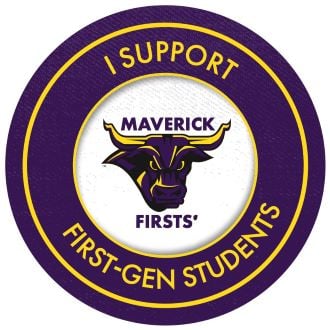Faculty and Staff Resources
Helping students achieve their goals, grow as individuals and prepare them for next steps are priorities for any faculty and staff member at Minnesota State University, Mankato. Here you will find resources to help you better understand and work with first-generation students
Organizations Connected to First-Generation Students
Center for First-Generation Student Success
The Center for First-generation Student Success, an initiative of NASPA and The Suder Foundation, is the premier source of evidence-based practices, professional development, and knowledge creation for the higher education community to advance the success of first-generation students. This website provides context for the current state of first-generation student success, shares current conversations and scholarly literature, offers access to programs and services, and highlights opportunities for engagement with the Center and committed colleagues.
Working-Class Studies Association
The Working-Class Studies Association supports scholarship, teaching, and activism related to working-class life and cultures.
The Pell Institute for the Study of Opportunity in Higher Education
The Pell Institute for the Study of Opportunity in Higher Education, sponsored by the Council for Opportunity in Education, conducts and disseminates research and policy analysis to encourage policymakers, educators, and the public to improve educational opportunities and outcomes for low-income, first-generation, and disabled college students. The Pell Institute is the first research institute to specifically examine the issues affecting educational opportunity for this growing population.
TRIO, U.S. Department of Education
The Federal TRIO Programs (TRIO) are Federal outreach and student services programs designed to identify and provide services for individuals from disadvantaged backgrounds. TRIO includes eight programs targeted to serve and assist low-income individuals, first-generation college students, and individuals with disabilities to progress through the academic pipeline from middle school to postbaccalaureate programs. TRIO also includes a training program for directors and staff of TRIO projects.
Books of Potential Interest
- Bridges: United States Academia for First-Generation and International College Students - written by Shawn Higgins
- Bridges introduces students to a wide range of concepts, institutions, histories, and artifacts of United States college and university life.
- Clearing the Path for First-Generation College Students: Qualitative and Intersectional Studies of Educational Mobility - written by Ashley C. Rondini, Bedelia Nicola Richards and Nicolas P. Simon
- Clearing the Path for First-Generation College Students comprises a wide range of studies that explore the multidimensional social processes and meanings germane to the experiences of first-generation college students before and during their matriculation into institutions of higher education.
- Coming Up Short: Working-Class Adulthood in the Age of Uncertainty - written by Jennifer M. Silva
- A powerful and compelling examination of young, working-class adults and the economic, social, and cultural forces that have upended their lives.
- Degrees of Inequality - written by Ann L. Mullen
- Degrees of Inequality reveals the powerful patterns of social inequality in American higher education by analyzing how the social background of students shapes nearly every facet of the college experience.
- Facing Social Class - written by Susan T. Fiske, Hazel Rose Marku
- Many Americans, holding fast to the American Dream and the promise of equal opportunity, claim that social class doesn't matter. Yet the ways we talk and dress, our interactions with authority figures, the degree of trust we place in strangers, our religious beliefs, our achievements, our senses of morality and of ourselves—all are marked by social class, a powerful factor affecting every domain of life.
- Inside the College Gates: How Class and Culture Matter in Higher Education - written by Jenny M. Stuber
- Social class matters in higher education; from influencing a students’ decision whether to attend college and where to attend college—in addition to affecting students’ success in graduating from—social class is too important to be overlooked in higher education. Inside the College Gates: How Class and Culture Matter in Higher Education contributes to a relatively sparse area of scholarship related to how social class influences students’ experiences in college, as most of the existing literature focuses on students’ entrance and exit without spending time examining whether students from different social classes experience campus life in unique ways.
- Intersectionality and Higher Education: Identity and Inequality on College Campuses - written by Scott Jaschik
- Diversity and inclusion are topics of conversation at most American colleges and universities. So are reports of frustrations of many students, faculty members and others who feel colleges are still designed for people of privilege -- generally those who are white and are middle or upper class.
- The Journey Before Us - written by Scott Jaschik
- First-generation students (those whose parents lack a college degree) can succeed in higher education, but they need support. Laura Nichols, an associate professor of sociology at Santa Clara University, makes the case in The Journey Before Us: First-Generation Pathways From Middle School to College (Rutgers University Press). The book is a mix of interviews with students and analysis of their stories.
- Paying for the Party - written by Allie Grasgreen
- If you are a low-income prospective college student hoping a degree will help you move up in the world, you probably should not attend a moderately selective four-year research institution. The cards are stacked against you. That’s the sobering bottom line of Paying for the Party: How College Maintains Inequality (Harvard University Press), a new book based on five years of interview research by Elizabeth A. Armstrong, an associate professor of sociology and organizational studies at the University of Michigan, and Laura T. Hamilton, an assistant professor of sociology at the University of California at Merced.
- The Privileged Poor - written by Anthony Abraham Jack
- Getting in is only half the battle. The Privileged Poor reveals how—and why—disadvantaged students struggle at elite colleges, and explains what schools can do differently if these students are to thrive.


